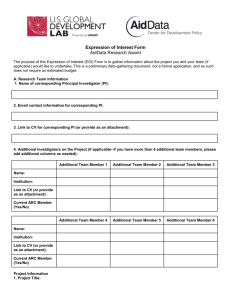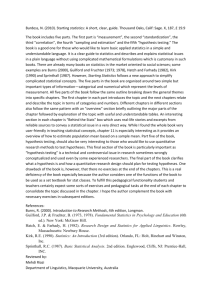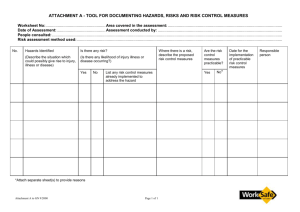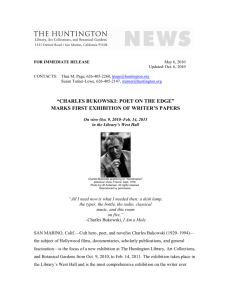Social and Emotional Development (E63 - NYU Steinhardt
advertisement
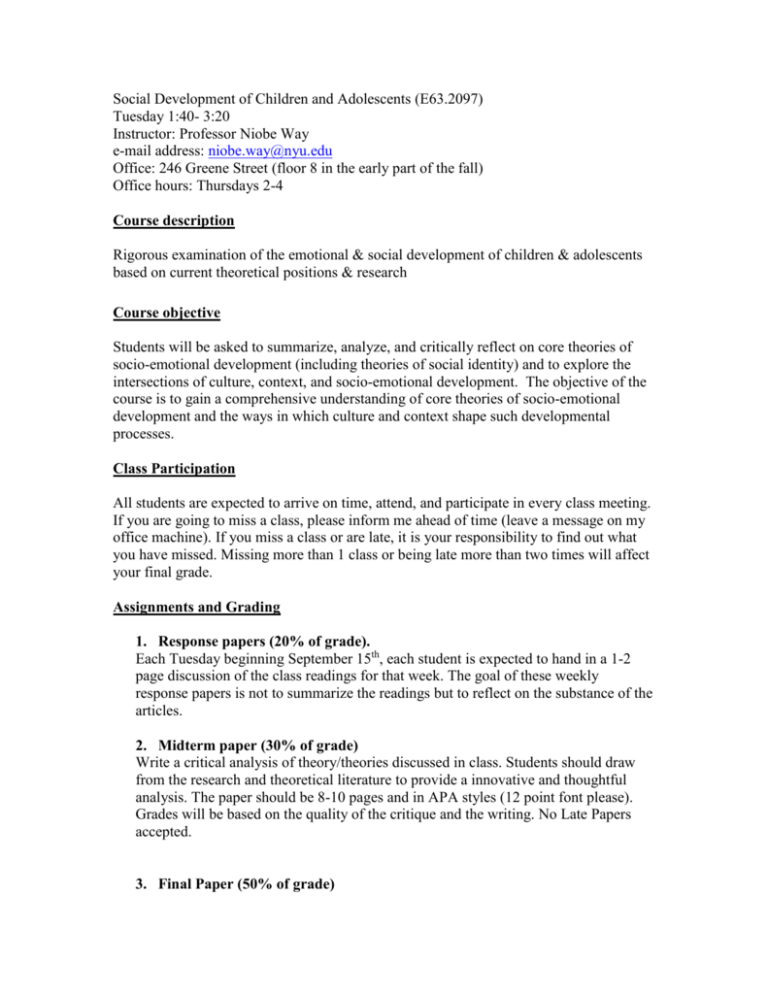
Social Development of Children and Adolescents (E63.2097) Tuesday 1:40- 3:20 Instructor: Professor Niobe Way e-mail address: niobe.way@nyu.edu Office: 246 Greene Street (floor 8 in the early part of the fall) Office hours: Thursdays 2-4 Course description Rigorous examination of the emotional & social development of children & adolescents based on current theoretical positions & research Course objective Students will be asked to summarize, analyze, and critically reflect on core theories of socio-emotional development (including theories of social identity) and to explore the intersections of culture, context, and socio-emotional development. The objective of the course is to gain a comprehensive understanding of core theories of socio-emotional development and the ways in which culture and context shape such developmental processes. Class Participation All students are expected to arrive on time, attend, and participate in every class meeting. If you are going to miss a class, please inform me ahead of time (leave a message on my office machine). If you miss a class or are late, it is your responsibility to find out what you have missed. Missing more than 1 class or being late more than two times will affect your final grade. Assignments and Grading 1. Response papers (20% of grade). Each Tuesday beginning September 15th, each student is expected to hand in a 1-2 page discussion of the class readings for that week. The goal of these weekly response papers is not to summarize the readings but to reflect on the substance of the articles. 2. Midterm paper (30% of grade) Write a critical analysis of theory/theories discussed in class. Students should draw from the research and theoretical literature to provide a innovative and thoughtful analysis. The paper should be 8-10 pages and in APA styles (12 point font please). Grades will be based on the quality of the critique and the writing. No Late Papers accepted. 3. Final Paper (50% of grade) All students will be expected to write a final paper that integrates theory and research on some aspect of social or emotional development. For their final papers, students have a choice of either analyzing additional material on topics that were covered in class or reviewing the literature on a topic that was not addressed in class but is directly relevant to the class material. Topics for final papers must be approved by the instructor. The paper should be typed, double spaced, and 15-18 pages in length. Grades on the final paper will be based on the quality of writing, the thoughtfulness of the paper, and on how well developmental theory and research are integrated. No late papers accepted. Academic Integrity It is important that students understand the academic code of conduct at New York University and follow it closely. Any form of academic misconduct, including plagiarism, will not be tolerated and will be subject to disciplinary procedures. Required Books: Bowlby, J. (1969). Attachment, (Vol.1) New York: Basic Books Cassidy, J. & Shaver, P.R. (1999). Handbook of Attachment (paperback version). Guilford Press Harwood R.G., Miller, J.G., & Irizarry, N.L. (1995). Culture & Attachment New York: Guilford Press. Chen, X., French, D. & Schneider, B. (2006). Peer Relationships in Cultural Context. Cambridge University Press. Hrdy, S. (2009). Mothers and Others: The Evolutionary origins of mutual understanding. Harvard University Press. Rubin, K, Bukowski, W., & Laursen, B. (2008). Handbook of Peer Interactions, Relationships, and Groups. Guilford Press. REQUIRED BOOKS MAY BE PURCHASED AT THE NYU BOOK STORE (or Amazon.com). Course Schedule September 8: Introduction—Contextualizing Socio-emotional Development September 15: The Ecology of Socio-Emotional Development Bronfenbrenner, U. (1977). Toward an experimental ecology of human development. American Psychologist. 32, 513-531. Gilligan, C. (1996). The centrality of relationships in human development: A puzzle, some evidence, and a theory. In Noam, Gil G.; Fischer, Kurt W. Development and vulnerability in close relationships. The Jean Piaget symposium series. (pp. 237-261). Hillsdale, NJ, England: Lawrence Erlbaum Associates, Inc. xx, 352 pp. PART 1: FAMILY RELATIONSHIPS September 22: Attachment Theory Bowlby, J. (1969/1982) Vol. 1 Attachment, Chapters 14- 19 Ainsworth, M. & Bowlby, J. (1989). An Ethological Approach to Personality Development. American Psychologist, 46, 333-341 September 29: Attachment Theory Cassidy, J. (1999). Handbook of Attachment. Chapters 1, 5, 12, 15 October 6th: Cultural Perspectives on Attachment Theory Harwood, R.L., Miller, J.G., & Irizarry, N. L., (1995). Culture and Attachment. All chapters October 13th: Evolutionary perspectives on Child Attachment Hrdy, S. Mothers and Others (2009). Chapters 1-4, 9. October 20: Theories of Temperament Kagan, J. (1998). Galen’s Prophecy: Temperament in Human Nature, Chapters 2, 4. Cassidy, J. (1999). Handbook of Attachment, Chapter 10 Part II PEERS AND FRIENDS October 27th Theories and Research on Peers and Friends Rubin, K, Bukowski, W., & Laursen, B. (2008). Handbook of Peer Interactions, Relationships, and Groups. Guilford Press. Chapters 1,2, 7, 10, 12, 31 MIDTERM PAPER DUE********* November 2nd: Gender, Peers, and Friends Rubin, K, Bukowski, W., & Laursen, B. (2008). Handbook of Peer Interactions, Relationships, and Groups. Guilford Press. Chapter 21 Brown, L. Way, & Duff, J. (1999). The Others in My I: Adolescent Girls’ friendships and peer relations.In N. Johnson (Eds). Beyond Appearance: A New Look at Adolescent Girls. APA press. In N.Way & J. Chu (Eds). Adolescent Boys: Diverse cultures of Boyhood, New York University Press. Chapters 2 and 9. November 10th Race/Ethnicity/Nationality, Peers, and Friends Rubin, K, Bukowski, W., & Laursen, B. (2008). Handbook of Peer Interactions, Relationships, and Groups. Guilford Press. Chapter 22 Chen, X., French, D. & Schneider, B. (2006). Peer Relationships in Cultural Context. Cambridge University Press. TBD November 17: Proximal and Distal influences on Peers and Friends Rubin, K, Bukowski, W., & Laursen, B. (2008). Handbook of Peer Interactions, Relationships, and Groups. Guilford Press. Chapters 23, 26, 27, 28 Hamm, J., & Faircloth, B. (2005). The Role of Friendships in Adolescents’ Sense of School Belonging. In N. Way & Hamm, J. (Ed). The Experience of Close Friendships in adolescence. PART III: SCHOOLS AND SOCIO-EMOTIONAL DEVELOPMENT November 24th: Schools: The link between schools and socio-emotional adjustment Eccles, J. & Roeser, R. (2005) School and Community Influences on Human Development. In M. Bornstein and M. Lamb Developmental science: An advanced textbook (5th ed.). (pp. 513-555). Mahwah, NJ, US: Lawrence Erlbaum Associates Publishers. vii, 657 pp. Roeser, R., Eccles, J., & Sameroff, A. (2000). School as a context of early adolescents' academic and social-emotional development: A summary of research findings. Elementary School Journal. Vol 100(5), May 2000, pp. 443-471 Way, N., Reddy, R., & Rhodes, J. (In press). Students’ Perceptions of School Climate during the Middle School Years: Associations with Trajectories of Psychological and Behavioral Adjustment. Journal of School Psychology. PART IV: THE DEVELOPMENT OF SOCIAL IDENTITIES December 1: The Development of Social Identities Spencer, M. & Markstrom-Adams (1990). Identity Processes among Racial and Ethnic Minority Children in America. Child Development Phinney, J. & Ong, A. (2007). Conceptualization and measurement of ethnic identity: Current status and future directions. Journal of Counseling Psychology. Vol 54(3), Jul 2007, pp. 271-281 Maccoby, E. (1990). Gender and relationships: A developmental account. American Psychologist Ruble, D., Alvarez, J, Bachman, M. & Cameron, J. (2004). The Development of a sense of “we”: The Emergence and implications of children’s collective identity.” In M. Bennett and F. Sani (Eds). The development of the social self. December 8th: Racial, Ethnic, and Gender Socialization of Identity Development Hughes, D. (2007). Parents' Ethnic-Racial Socialization Practices: A Review of Research and Directions for Future Study. Developmental Psychology. Vol 42(5), Sep 2006, pp. 747-770 Ruble, D., Martin, C., & Berenbaum, S. (2006) Gender Development. In Eisenberg, Nancy; Damon, William; Lerner, Richard M. Handbook of child psychology: Vol. 3, Social, emotional, and personality development (6th ed.). (pp. 858-932). Hoboken, NJ, US: John Wiley & Sons Inc. xxiv, 1128 pp. December 15th The Social Development of Children and Adolescents: Summary of Course Final Paper is Due December 15th
